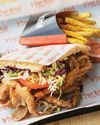試す 金 - 無料
When Small is Big: How LPUs Continue to Redefine India's FMCG Market
Images Business of Food
|November 2025
In the early 1980s, India’s FMCG scene was sharply divided—urban middle classes bought bottled shampoos and creams, while rural consumers largely relied on homemade or unbranded alternatives. CavinKare’s Chik shampoo shattered this divide by introducing a Re. 1 sachet that brought personal care to every household. The innovation was deceptively simple: make the entry point small enough for everyone, yet big enough for brand recall.

The results were seismic. Within years, the shampoo market exploded. Competitors like Clinic Plus, Sunsilk, Pantene, and Nyle followed suit, turning sachets into the default format for a billion heads of hair. By the mid-1990s, over 65% of shampoo sales in rural India came from sachets—a model that would later inspire food and beverage brands to reimagine their packaging and pricing architecture.
The LPU Logic: Why Small Works in India
At its heart, the LPU strategy rests on an elegant triad of truths about Indian consumption:
Affordability Drives Adoption: For a nation where nearly 800 million people live on daily budgets under Rs.250, the Rs.5-Rs.20 band is psychologically and financially accessible. LPUs transform aspiration into action.
Trial Drives Trust: Smaller units reduce perceived risk. Consumers can “test” a brand without long-term commitment.
Volume Beats Margin: While margins per pack may be thin, the velocity of volume across India’s 12 million kirana stores creates profitability through scale.
No wonder every FMCG CEO in India refers to the LPU as “the ultimate penetration lever.
In India, the smallest pack often carries the biggest story. The Re. 1 shampoo sachet, the Rs.5 biscuit packet, the Rs. 10 noodle pouch, or the single-serve spice sachet—each is a symbol of how India consumes, as much as how brands sell. In a nation where affordability defines accessibility, Low Price Units (LPUs) have not only rewritten FMCG marketing playbooks but also created one of the most inclusive consumption ecosystems in the world.
When Pack Size Became Strategy
By the early 2000s, the sachet principle had crossed over into food. The Rs.5 biscuit revolution, led by Parle-G, Britannia Marie, and Sunfeast Glucose, proved that mini-packs could deliver mammoth market share.
このストーリーは、Images Business of Food の November 2025 版からのものです。
Magzter GOLD を購読すると、厳選された何千ものプレミアム記事や、10,000 以上の雑誌や新聞にアクセスできます。
すでに購読者ですか? サインイン
Images Business of Food からのその他のストーリー

Images Business of Food
LOTTE India appoints Debabrata Mukherjee as Managing Director for its Ice Cream Division Havmor Ice Cream
LOTTE India Corporation Ltd. announced the appointment of Debabrata Mukherjee as Managing Director for its Ice Cream Division - Havmor Ice Cream. In his new role, Mukherjee will lead the strategic direction and business growth of LOTTE India's ice cream portfolio, steering innovation and expansion for Havmor Ice Cream.
1 min
November 2025

Images Business of Food
Heritage Foods acquires majority stake in Get-A-Way, strengthening presence in the health-focused dessert segment
Heritage Foods Limited announced the acquisition of a majority stake in M/s. Peanut Butter and Jelly Private Limited, the company that owns Get-A-Way, India's pioneering guilt-free indulgence brand.
1 min
November 2025
Images Business of Food
Dabur Q2 Net Profit Rises 6.5% to Rs.453 Cr.; Launches Rs.500 Cr. Dabur Ventures
Dabur India Ltd. reported a 6.5% yearon-year rise in consolidated net profit to Rs53 crore for Q2 FY26, compared to Rs25 crore a year ago.
1 min
November 2025

Images Business of Food
Nestlé India Breaks Sales Records, But Profit Dips 24% Under Commodity Pressure
Nestlé India delivered a paradoxical performance in its latest quarter — achieving its highest-ever quarterly revenue, yet witnessing a notable 24% decline in net profit. The FMCG major clocked a robust Rs.5,644 crore in revenue, marking an 11% year-on-year increase, powered by strong growth across its flagship brands, including Maggi noodles, KitKat, Nescafé, and milk-based beverages.
2 mins
November 2025

Images Business of Food
UNIBIC Foods appoints Ajay Bathija as Chief Executive Officer
UNIBIC Foods announced the appointment of Ajay Bathija as its Chief Executive Officer.
1 min
November 2025

Images Business of Food
German Doner Kebab enters Indian market, plans 450 outlets in 15 years
German Doner Kebab (GDK), the international fast-casual restaurant brand, announced its entry into India through a master franchise agreement with GBC India.
1 min
November 2025
Images Business of Food
FSSAI Tightens the Lid on 'ORS' Branding: No More Misleading Labels Allowed
The Food Safety and Standards Authority of India (FSSAI) has drawn a decisive line under the misuse of \"ORS\" (Oral Rehydration Solution) in beverage branding, bringing an end to years of regulatory ambiguity. In a landmark order issued on 14 October 2025, the regulator officially withdrew earlier advisories that had permitted companies to use \"ORS\" on labels provided they displayed disclaimers. The latest directive now completely bans the use of the term \"ORS\"—with or without modifiers—on any food or beverage product.
2 mins
November 2025

Images Business of Food
When Small is Big: How LPUs Continue to Redefine India's FMCG Market
In the early 1980s, India’s FMCG scene was sharply divided—urban middle classes bought bottled shampoos and creams, while rural consumers largely relied on homemade or unbranded alternatives. CavinKare’s Chik shampoo shattered this divide by introducing a Re. 1 sachet that brought personal care to every household. The innovation was deceptively simple: make the entry point small enough for everyone, yet big enough for brand recall.
5 mins
November 2025

Images Business of Food
TGI Fridays partners with USR Hospitality to launch 51 outlets across India
Global casual dining chain TGI Fridays announced a strategic partnership with USR Hospitality to establish 51 restaurants across India, marking one of the brand's largest expansion plans in the Asia-Pacific region.
1 min
November 2025

Images Business of Food
Debt Overhang Forces Bira 91 to Cede The Beer Café as Kirin and Anicut Invoke Collateral
India's fast-growing craft beer label Bira 91 has lost managerial grip over its pub and restaurant arm, The Beer Café, after key investors enforced their collateral rights. According to The Economic Times, Japan's Kirin Holdings and domestic financier Anicut Capital have invoked pledged shares in BTB (Better Than Before) — the entity running The Beer Café's 40-plus outlets along with allied ventures such as Bira 91 Taprooms, Thirsty (its “cloud bar”), Instacrave Kitchens and Burger Brewery. The enforcement virtually severs B9 Beverages — Bira 91's parent — from any equity ownership in BTB, shifting control to the creditor-investor group.
1 mins
November 2025
Listen
Translate
Change font size

